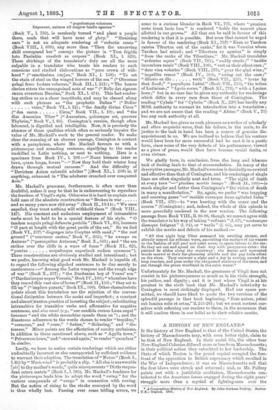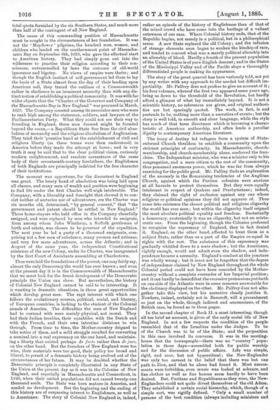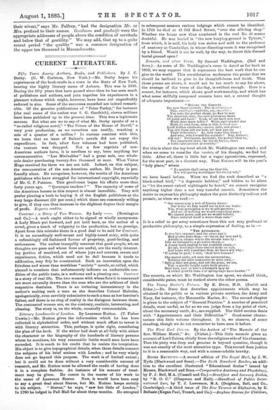A HISTORY OF NEW ENGLAND.*
IF the history of New England is that of the United States, the history of Massachusetts may, with even better right, claim to be that of New England. In their social life, the other four New-England Colonies differed more or less from Massachusetts ; in their political action they submitted to her leadership. The State of which Boston is the proud capital occupied the fore- front of the opposition to British supremacy which resulted in the War of Independence; it was on Massachusetts soil that the first blows were struck and returned ; and, as Mr. Palfrey points out with a justifiable exultation, Massachusetts con- tributed to the American. forces engaged during the eight years' struggle more than a myriad of fighting-men over the * A Compendious History of New Eagland. By John Gorham Palfrey. Boston U.S.: Osgood. 1584. total quota furnished by the six Southern States, and much more than half of the contingent of all New England..
The cause of this commanding position of Massachusetts must be sought in the circumstances of her foundation. It was not the 'Mayflower' pilgrims, the hundred men, women, and children who landed on the southernmost point of Massachu- setts Bay on September 6th, 1619, who gave the effectual start to American history. They bad simply gone out into the wilderness to practise their religion according to their con- sciences, untrammelled by laws the outcome of old-world ignorance and bigotry. No views of empire were theirs ; and though the English instinct of self-government led them to lay the basis of a State almost from the day of their landing upon American soil, they traced the outlines of a Commonwealth rather in obedience to an imminent necessity than with any dis- tinct notion of establishing a political community. It was with far wider objects that the "Charter of the Governor and Company of the Massachusetts Bay in New England" was procured in March, 1629. The Company counted among its associates men who were to rank high among the statesmen, soldiers, and lawyers of the Parliamentarian Party. What they could not see their way to founding in England, these men deemed might be founded beyond the ocean,—a Republican State free from the civil abso- lutism of monarchy and the religious absolutism of Anglicanism. They tried their 'prentice hand at the establishment of civil and religions liberty (as these terms were then understood) in America before they made the attempt at home ; and in very truth it may be said that to the clear political vision, curiously modern enlightenment, and resolute earnestness of the same body of their seventeenth-century forefathers, the Englishmen of both Englands are principally indebted for the free character of their institutions.
The moment was opportune, for the discontent in England was great. The heavy hand of absolutism was being laid upon all classes, and many men of wealth and position were beginning to find life under the first Charles well-nigh intolerable. The Company, with a liberality and foresight that showed it to con- sist neither of sectaries nor of adventurers, ere the Charter was six 'months old, determined, "by general consent," that "the government and patent should be settled in New England." Those home-stayers who held office in the Company cheerfully resigned, and were replaced by men who intended to emigrate, from among whom John Winthrop, a Suffolk gentleman of birth and estate, was chosen to be governor of the expedition. The next year he led a party of a thousand emigrants, com- prising not a few men of substance, many yeomen and artisans, and very few mere adventurers, across the Atlantic ; and in August of the same year, the independent Constitutional existence of the new Colony, under its Charter, was inaugurated by the first Court of Assistants assembling at Charlestown.
Thus were laid the foundations of the purest, one may fairly say, almost the only Democracy the world has ever known ; and even at the present day it is in the Commonwealth of Massachusetts that we must look for the freest development of the Democratic principle the Union can show. But nevertheless, the history of Colonial New England cannot be said to be interesting. It is wanting in dramatic situations, in those great opportunities which develop great men. The rapt interest with which one follows the evolutionary courses, political, social, and literary, of European countries, is lacking to the student of the Colonial annals of America. The difficulties the men of New England had to contend with were mainly physical, not moral. They had their Indian troubles, their squabbles with the Dutch and with the French, and their own intestine divisions to win through. From time to time, the Mother-country deigned to take notice of them, and a mild struggle resulted for converting a nominal into a real supremacy on the one hand, and maintain- ing a liberty that existed perhaps de facto rather than de jure, on the other hand. Ent the founders of New England were too wise, their materials were too good, their policy too broad and liberal, to permit of a dramatic history being evolved out of the circumstances of her future. It may be doubted whether the Democratic principle is completely illustrated in any State of the Union at the present day as it was in the Colonies of New England, and especially in Massachusetts and Connecticut, in 1640, when their united populations did not exceed twenty-one . thousand souls. The State was born mature in America, and needed no development. But the beginning and the ending of this history are of surpassing interest to Englishmen, as well as to Americans. The story of Colonial New England is, indeed,
rather an episode of the history of Englishmen than of that of the mixed crowd who have come into the heritage of a valiant ontswarm of our race. Where Colonial history ends, that of the Republic begins, not merely in a political, but in a philosophical sense. A new State replaced the old Colony ; and the infusion of strange elements soon began to weaken the kinship of race, and tended to convert what was a merely political alienship into an alienship of blood. Hardly a fourth of the present population of the United States is of pure English descent ; and in the States of the Mississippi Valley and of the Pacific slope a thoroughly differentiated people is making its appearance.
The story of the great quarrel has been variously told, not yet by any writer with any approach to the needed but difficult im- partiality. Mr. Palfrey does not profess to give an account of it ; his four volumes, whereof the first two appeared some years ago„ bring us down to the threshold of the Revolution, but hardly afford a glimpse of what lay immediately beyond. It is not a scientific history, no references are given, and original authori- ties are but sparingly quoted. The work, in fact, is and pretends to be, nothing more than a narrative of events ; but the story is well told, in smooth and clear language, while the style has much of that terse directness which is becoming a charac- teristic of . American authorship, and often lends a peculiar dignity to contemporary American literature.
The irony of destiny led refugees from a system of State- enforced Church thraldom to establish a community upon the strictest principles of conformity. In Massachusetts, church- membership, and church-membership alone, conferred the fran- chise. The Independent minister, who was a minister only to his congregation, and a mere citizen to the rest of the community, thus possessed enormous power, which he was far from always exercising for the public good. Mr. Palfrey finds an explanation of the anomaly in the Romanising tendencies of the Anglican Church, against which the Puritan colonists were anxious at all hazards to protect themselves. But they were equally intolerant in respect of Quakers and Presbyterians ; indeed, they claimed the right of exclusion against any one whose religions or political opinions they did not approve of. Thus came into existence the closest political and religions oligarchy the world has ever seen ; but within the oligarchy itself reigned the most absolute political equality and freedom. Esoterically a democracy, exoterically it was an oligarchy, but not an aristo- cratic one. From the beginning, though the Colonies professed to recognise the supremacy of England, they in fact denied it. England, on the other hand, affected to treat them as a subject State, rather than as a part of the Empire co-equal in rights with the rest. The substance of this supremacy was gradually whittled down to a mere shadow ; but the Americans, rightly enough, would not admit even the shadow, and inde- pendence became a necessity. England's conduct at the juncture was wholly wrong ; but it must not be forgotten that the degree of independence claimed by New England throughout the whole Colonial period could not have been conceded by the Mother- country without a complete surrender of her Imperial position; and it can hardly be deniedthat the excessive pretensions putforth on one side of the Atlantic were in some measure answerable for the obstinacy displayed on the other. Mr. Palfrey does not alto- gether take this view, but his narrative clearly justifies it. Nowhere, indeed, certainly not in Bancroft, will a presentment so just on the whole, though indirect and unconscious, of the British case, be found as in these pages.
In the second chapter of Book IL a most interesting, though all too brief an account, is given of the early social life of New England. In not a few respects the condition of the people resembled that of the Israelites under the Judges. To be of the Church was to be of the State ; and the proposition in this case involved its converse. It was in the meeting- house that the townspeople—there was no " country " popu- lation in those days—assembled both for public worship and for the discussion of public affairs. Life was simple, rigid, and sour, but not hypocritical ; the New-Englander was only too earnest in the belief that there was but one path to Zion, and that he alone had found it. Most amuse- ments were forbidden, even music was looked at askance, and fine clothes as well as fine houses seem hardly to have been desired. But, Puritans and Republicans as they were, the New- Englanders could not quite divest themselves of the old Adam. They established a certain social hierarchy, which, though of a simple sort, was rigidly defined. "Only a small number of persons of the best condition (always including ministers and their wives)," says Mr. Palfrey, "had the designation Mr. or Mrs. prefixed to their names. Goodman and goodwife were the appropriate addresses of people above the condition of servitude and below that of gentility." We may add, that up to a quite recent period "the quality" was a common designation of the upper ten thousand in Massachusetts.




































 Previous page
Previous page